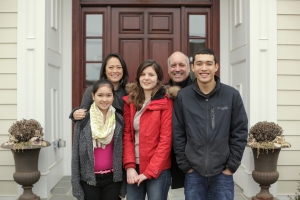We as a society are rapidly evolving into a shared economy. Fueled by rising housing prices and a basal instinct to feel part of a community, many people are sharing their work spaces, vehicles and homes with complete strangers. Hosting international students has become just another model of this trend.
The term “sharing economy” began to appear in the mid-2000s, as new business structures emerged inspired by enabling social technologies and an increasing sense of urgency around global population growth and resource depletion. – Wikipedia, Sharing Economy
In areas of Boston and other major urban centers, this sharing economy trend is thriving. Bikeshare companies, peer-to-peer car sharing like Getaround, and micro-entrepreneur taxi and hotel services like Uber and Airbnb are all changing the landscape of how we do business and get ourselves around town. Here in Kendall Square (MIT), the vibrant startup culture which relies on affordable, flexible workspace has boosted a new industry of shared co-working spaces. People even share garden space and household tools.
In our own city of Boston, we are experiencing an ongoing affordable housing crisis. Yet out of this, another model in the shared economy trend emerged largely as a result of the city’s unique popularity among international students. People are hosting these international high school students in their homes and getting paid a monthly stipend.
Such “collaborative consumption” is a good thing for several reasons. Owners make money from underused assets. For sociable souls, meeting new people by staying in their homes is part of the charm. – The Economist, The Rise of the Sharing Economy
Some people shy away from becoming a host family because they think it’s only available to those who subscribe to the traditional model of a married couple with 2.5 kids, white picket fence, and home ownership. But in reality, people from all walks of life are welcome to host foreign students. We’ve met single parents, renters, and couples without kids who choose to become host families. All you need is a private bedroom with bed and desk, and a willingness to open up your home to someone from a different culture.

The homestay arrangement is not only beneficial to the host family, but also to the local economy. Foreign students contribute significantly to the financial health of the school they attend and community where they live. These students often pay full tuition—even at public high schools—and purchase items like electronics and food, in addition to spending money on activities like movies and local attractions.
Here are some reasons families choose to host international students:
- You can collect $850- $1,000 per month to offset the cost of your monthly rent or mortgage
- Help boost your local economy
- Learn about another culture and learn a new foreign language
- Share your own customs
- Build memories and friendships
The notion of hosting foreign exchange students is not new. But for decades it was only open to J-1 exchange students, and host families were not allowed to collect money. In the changing landscape of study abroad and the sharing economy, international students are attending U.S. high schools on an F-1 visa, which allows them to graduate with an American high school diploma. And American host families can collect a monthly stipend.
Have you hosted an international student? Tell us your stories!








